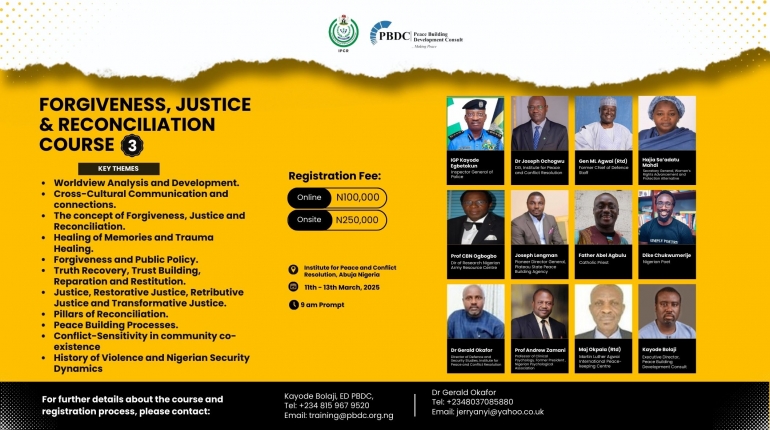
FORGIVNESS, JUSTICE & RECONCILIATION COURSE 3
Violent conflicts have enduring effects on nation-building. They shape beliefs and patterns of behaviour as well as public policies. If healing does not take place, the violence gets passed down to future generations, continuing the cycle of violence. The financial implications of violence (including from recurrent conflicts) in Nigeria are staggering, and the toll violence has taken on our society is immeasurable. What are the root causes of (especially recurrent) violence? Our beliefs, perceptions, and projections take center stage. These processes create how we see “the other," which in turn fuels the fire for more violence to take place. How then can we shift our thinking about “the other” in a more empathic way - to be able to see "the other" as a human being - a human being who is capable of inflicting pain - a human being who also feels pain and may be in pain - and ultimately a human being who is not much different than ourselves? Healing the wounds of history through forgiveness, justice and reconciliation is a practical way out, and a way that unites people instead of destroying them.
Scholars, who have done extensive research on religion and politics, conclude that a new form of conflict transformation - peacebuilding - is taking shape on the ground, in and across local communities plagued by violence. Since the end of the Cold War, there has been growing cooperation between nations, and an increasing number of apologies, acts of forgiveness and reconciliation throughout the world. This has prompted scholars of conflict resolution to shift their focus from conflict resolution to concepts such as reconciliation and forgiveness, concepts that reflect more correctly the spirit and practice of the new age. The power of forgiveness as a means of conflict resolution or transformation allows human beings to come to terms with their undesirable past, thereby changing the rule that governs the power relationship between the former victimizer and his or her victim.
The initial and perhaps, natural reaction of every wronged person is that the offender should be punished for the offence. Justice traditionally understood in a retributive sense may be applied for certain violent conflicts and crimes, but at other times retributive justice may have to give way to the creation of an atmosphere for the rebuilding of community peace. Sometimes, it is necessary, that for a society to move on, certain traditional aspects of justice should be addressed in alternative ways. It is in this context that the role of restorative justice as a means to address the problem through measures such as truth recovery, reparation, restitution and so on becomes important. It creates a space within which the perpetrators of certain crimes might rejoin the community; they can be helped to regain something of their lost humanity and re-establish their connectedness. Allowing victims to come forward without fear of retribution to recount the often-grim details of how various family members have disappeared, been raped, or murdered, for example, (especially in front of perpetrators), exposes the pattern of abuses from community to community and this allows a process of social introspection, mourning and healing to take place. The testimony of perpetrators allows us to have a clearer picture of the events even as their actions are exposed. By bringing these events out into the open, the power of the perpetrators over their victims is finally severed.
It is in light of the above that the Institute for Peace and Conflict Resolution (IPCR) and the Peace Building Development Consult (PBDC) are hosting a 3-day course on Forgiveness, Justice and Reconciliation. The FJRC is based on the assumption that forgiveness, justice and reconciliation are social and political virtues that are indispensable for the construction of sustainable peace and nation-building.
RATIONALE
The premise behind this training program is that if victims do not heal from their psychological wounds, they have a higher likelihood of becoming future perpetrators of crime and that if perpetrators are not exposed to their crimes and their effects on others, they may never understand any alternative perspectives.


